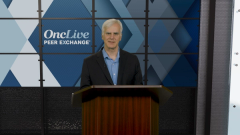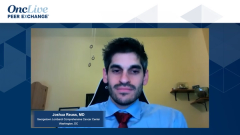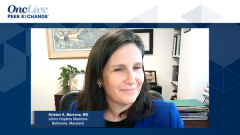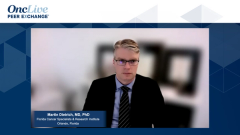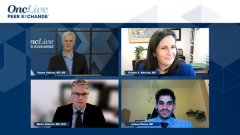
Selecting Therapy for Advanced NSCLC Based on PD-L1 and NGS Testing
Shared insight on the value that molecular testing and PD-L1 testing, respectively, have on determining optimal therapy for patients with advanced non–small cell lung cancer.
Episodes in this series

Transcript:
Balazs Halmos, MD, MS: Coming back to the conversation about combination I/O [immuno-oncology] vs single-agent I/O, the KEYNOTE-598 study looked at that specific question: pembrolizumab plus or minus ipilimumab. It didn’t identify a difference for the TPS [tumor proportion score]–high patients. Looking at the molecular profile, it’s not the single marker. What are some specific aspects in the NGS [next-generation sequencing] report that will factor into your decision-making in terms of single-agent I/O [immuno-oncology] vs TMB [tumor mutational burden] vs single gene alterations?
Kristen A. Marrone, MD: NGS reports can tell us a lot. They help us talk with our patients about how these regimens could work for them at a single-person level. When I look at our NGS reports, I look at TMB. TMB is a heterogeneous marker in general. When TMB is very high, I look to the individual mutations to see if those can tell me something more. A high TMB with KRAS, STK11, or KEAP1 is a little different from a high TMB with KRAS, TP53, and something else. We have data to show that those have different outcomes with I/O. Quantitatively, TMB can be very exciting if it’s very high, but you still need the context of the individual genes to talk about it with each patient.
I get more excited for a PD-L1 of 80% to 100% than I do for 50% to 60% at this point. The data out of Boston and from the studies you were just talking about are convincing. That excitement translates in talking to patients, so then they get excited about getting 1 drug and not needing chemotherapy. That’s helpful in terms of talking with patients.
Your point is true about the nivolumab-ipilimumab data being inversely related to PD-L1. We’ve had this divergence of PD-L1 and TMB and what to do with that. When that happens, the nivolumab-ipilimumab makes a lot of sense. If the PD-L1 is low and the TMB is low, then I’d go more to the quadruplet if a patient is very fit and we’re trying to get CTLA4 in there. Each patient’s NGS report has a lot to offer in terms of making decisions among these different agents.
Balazs Halmos, MD, MS: You’ve all mentioned combination I/O and a TPS of 0, but that’s a setting where we don’t have a combination I/O regimen alone approved. Do you use the CheckMate 9LA and POSEIDON regimens for those specific patients, or just nivolumab-ipilimumab?
Martin Dietrich, MD, PhD: We don’t have it approved by the FDA. We do have guideline support for ipilimumab-nivolumab for PD-L1–negative [patients]. In my opinion, part 1B of CheckMate 227 was more exciting than part 1A. The data were convincing that in a prospective phase 3 study, ipilimumab-nivolumab outperforms chemotherapy-nivolumab. If you think PD-1s are performing similarly, this question has to be asked. Obviously there were some regulatory issues with the study, some readouts that didn’t make this look very elegant, but we’ve seen similar signals in other studies. We’ve seen it in CheckMate 9LA by looking at the PD-L1 negatives, which at least equilibrate the outcomes of PD-L1 positives. We’ve seen a similar picture in POSEIDON. We have 3 phase 3 prospective studies confirming the CTLA4 benefit, particularly pronouncing the PD-L1 negatives by extension. These data are also applicable to PD-L1 levels that are otherwise unfavorable. We should give CTLA4 a second look for these patients. I don’t think the chemotherapy–I/O single-agent PD-1s performs that much better than single-agent PD-1s in the PD-L1 negatives. Now that we have options, we should use them.
Balazs Halmos, MD, MS: That’s a great comment in terms of nivolumab-ipilimumab and TPS 0. The 5-year update came out a couple of weeks ago and showed a 19% overall survival for patients receiving nivolumab-ipilimumab with TPS 0. That’s an unprecedented 5-year outcome for the patient population.
Transcript edited for clarity.


